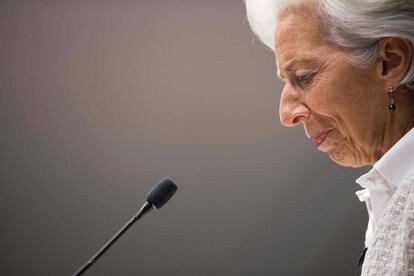IMF calls on Spain to raise VAT and revise health, education spending
The organization also criticizes the abuse of temporary contracts and is calling for labor market reforms
The International Monetary Fund (IMF) has called on Spain to raise reduced rates of value-added tax (VAT), special taxes and environmental levies, including those on fuel. What’s more, it is calling on the government to look into the efficiency of spending on education and health. The aim of all of these changes is to bring down the deficit and public debt, the size of which, says the global organization, is leaving the Spanish economy “highly vulnerable to external disturbances.”

“We are not suggesting austerity,” said Andrea Shaechter, the IMF economist in charge of monitoring the progress of the Spanish economy, at a press conference at the Bank of Spain on Tuesday. “The adjustment can be gradual and be carried out via tax hikes,” he added, using the example of sales tax. “Compared to the rest of Europe, there is a large margin in terms of the reduced rates of Value Added Tax [in Spain], such as the rate collected by restaurants.”
In its analysis of the Spanish economy, the institution headed up by Christine Lagarde says that the country’s public deficit could end up coming in above original forecasts. “Immediate attention should be focused on restarting a gradual fiscal consolidation with the aim of setting the high volume of public debt on a steady descending course,” the IMF concludes.
Immediate attention should be focused on restarting a gradual fiscal consolidation
IMF report on Spain
As such, it is calling for a structural readjustment of around 0.5% of GDP a year – that’s to say, around €5.5 billion. With this change, an “adequate balance between maintaining the economic recovery and the long-term sustainability of public finances” can be found, it argues.
The way to do this, according to the IMF, is through tax rises. “Spain can allow itself a rise in revenues,” the report argues. “By gradually reducing the number of VAT exemptions, the amount it collects would approach those of other EU countries. What’s more, and especially in these times of low energy prices, there is room to raise special taxes and environmental rates, as well as dealing with the inefficiencies and differentiated treatment of the tax system,” it argues. The IMF believes that this would see the tax burden pass from work to consumption, which would help growth.
The IMF also criticized the widespread use of temporary hiring in Spain. While the institution highlights the robust rhythm of growth in the economy, and praises the reforms already carried out, it emphasizes that there is an excessive duality in the labor market still. “The greatest part of new jobs are of a temporary nature, and the duality in the work market particularly accentuates the volatility of employment and inhibits investment in human capital and the productivity of workers.”
The IMF believes Spain’s priority is the creation of jobs among two very vulnerable groups
To deal with this problem, it recommends reforms that would make indefinite contracts more attractive for employees, as well as offering greater legal guarantees to companies when it comes to layoffs, and allowing greater flexibility in terms of work conditions.
The institution believes that Spain’s immediate priority is the creation of jobs among two very vulnerable groups: the long-term unemployed and unskilled youngsters. In the opinion of the IMF, the policies that have been applied to these two groups have had a “limited” impact and there is room for improvement. The IMF encourages regional governments to make a greater effort and for subsidies on hiring to be allocated in a more efficient manner. Shaechter said a more individualized treatment of the long-term unemployed was a priority.
English version by Simon Hunter.
Tu suscripción se está usando en otro dispositivo
¿Quieres añadir otro usuario a tu suscripción?
Si continúas leyendo en este dispositivo, no se podrá leer en el otro.
FlechaTu suscripción se está usando en otro dispositivo y solo puedes acceder a EL PAÍS desde un dispositivo a la vez.
Si quieres compartir tu cuenta, cambia tu suscripción a la modalidad Premium, así podrás añadir otro usuario. Cada uno accederá con su propia cuenta de email, lo que os permitirá personalizar vuestra experiencia en EL PAÍS.
¿Tienes una suscripción de empresa? Accede aquí para contratar más cuentas.
En el caso de no saber quién está usando tu cuenta, te recomendamos cambiar tu contraseña aquí.
Si decides continuar compartiendo tu cuenta, este mensaje se mostrará en tu dispositivo y en el de la otra persona que está usando tu cuenta de forma indefinida, afectando a tu experiencia de lectura. Puedes consultar aquí los términos y condiciones de la suscripción digital.









































